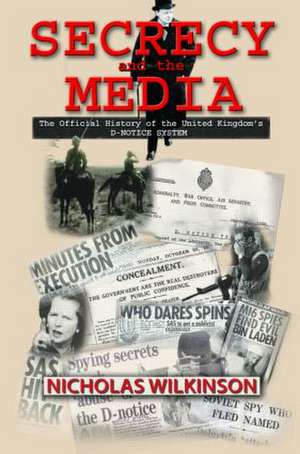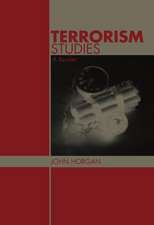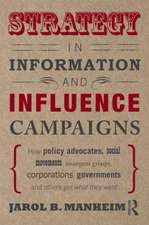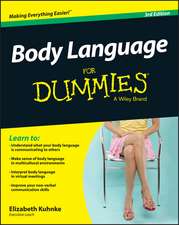Secrecy and the Media: The Official History of the United Kingdom's D-Notice System: Government Official History Series
Autor Nicholas John Wilkinsonen Limba Engleză Hardback – 26 mai 2009
From Victorian times, British governments have consistently seen the need, in the public interest, to prevent the media publishing secret information which would endanger national security. The UK media have meanwhile continuously resisted official attempts to impose any form of censorship, arguing that a free press is in the public interest. Both sides have normally seen the pitfalls of attempting to resolve this sometimes acrimonious conflict of interests by litigation, and have together evolved a system of editorial self-regulation, assisted by day-to-day independent expert advice, known colloquially as the D-Notice System.
The book traces the development of this system from nineteenth-century colonial campaigns, through two world wars, to modern operations and counter-terrorism in the post-Cold War era, up to the beginning of the Labour government in 1997. Examples are drawn from media, political and official sources (some not yet open), and cover not only defence issues (including Special Forces), but also the activities of the secret intelligence services MI5, MI6 and GCHQ. These cases relate principally to the UK, but also to American and other allies’ interests.
The story of how this sometimes controversial institution now operates in the modern world will be essential reading for those in the media and government departments, and for academics and students in the fields of security, defence and intelligence, as well as being an accessible exposé for the general reader.
Nicholas Wilkinson served in the Royal Navy 1959-98, and from 1999 to 2004 he ran the independent Defence, Press and Broadcasting Advisory Committee. He was a Press Complaints Commissioner from 2005 to 2008, and is a Cabinet Office Historian.
| Toate formatele și edițiile | Preț | Express |
|---|---|---|
| Paperback (1) | 468.51 lei 6-8 săpt. | |
| Taylor & Francis – 9 dec 2015 | 468.51 lei 6-8 săpt. | |
| Hardback (1) | 754.59 lei 6-8 săpt. | |
| Taylor & Francis – 26 mai 2009 | 754.59 lei 6-8 săpt. |
Din seria Government Official History Series
-
 Preț: 381.70 lei
Preț: 381.70 lei -
 Preț: 351.76 lei
Preț: 351.76 lei -
 Preț: 339.01 lei
Preț: 339.01 lei -
 Preț: 462.90 lei
Preț: 462.90 lei -
 Preț: 379.37 lei
Preț: 379.37 lei -
 Preț: 438.36 lei
Preț: 438.36 lei -
 Preț: 448.44 lei
Preț: 448.44 lei -
 Preț: 500.63 lei
Preț: 500.63 lei - 18%
 Preț: 1016.86 lei
Preț: 1016.86 lei -
 Preț: 468.51 lei
Preț: 468.51 lei -
 Preț: 337.87 lei
Preț: 337.87 lei - 25%
 Preț: 864.77 lei
Preț: 864.77 lei - 27%
 Preț: 837.47 lei
Preț: 837.47 lei -
 Preț: 428.18 lei
Preț: 428.18 lei - 11%
 Preț: 346.01 lei
Preț: 346.01 lei -
 Preț: 416.22 lei
Preț: 416.22 lei -
 Preț: 403.64 lei
Preț: 403.64 lei -
 Preț: 334.03 lei
Preț: 334.03 lei - 17%
 Preț: 268.23 lei
Preț: 268.23 lei - 18%
 Preț: 263.20 lei
Preț: 263.20 lei -
 Preț: 391.65 lei
Preț: 391.65 lei -
 Preț: 389.66 lei
Preț: 389.66 lei - 18%
 Preț: 1188.44 lei
Preț: 1188.44 lei - 23%
 Preț: 374.04 lei
Preț: 374.04 lei
Preț: 754.59 lei
Preț vechi: 887.75 lei
-15% Nou
Puncte Express: 1132
Preț estimativ în valută:
144.41€ • 150.21$ • 119.22£
144.41€ • 150.21$ • 119.22£
Carte tipărită la comandă
Livrare economică 14-28 aprilie
Preluare comenzi: 021 569.72.76
Specificații
ISBN-13: 9780415453752
ISBN-10: 0415453755
Pagini: 652
Ilustrații: 19 halftones and 2 line drawings
Dimensiuni: 156 x 234 x 36 mm
Greutate: 2.8 kg
Ediția:1
Editura: Taylor & Francis
Colecția Routledge
Seria Government Official History Series
Locul publicării:Oxford, United Kingdom
ISBN-10: 0415453755
Pagini: 652
Ilustrații: 19 halftones and 2 line drawings
Dimensiuni: 156 x 234 x 36 mm
Greutate: 2.8 kg
Ediția:1
Editura: Taylor & Francis
Colecția Routledge
Seria Government Official History Series
Locul publicării:Oxford, United Kingdom
Public țintă
General, Postgraduate, Professional, Professional Practice & Development, and UndergraduateCuprins
Preface Section 1: Pre-Formation – The Long Debate – 1880s-1912 1. Victorian Security and Press Interaction 2. Regulation of the Press, and the Boer War 3. Facing the Growing German Threat 4. Wrangling with the Press 5. Government Attempts to Litigate 6. Events Bring Matters to a Head Section 2: Formation and Early Modus Operandi of the Committee – 1912-14 7. Establishing the Committee 8. Establishing Machinery and Procedures 9. Establishing a Modus Operandi Pre-War Section 3: World War I, 1914-18 10. The Security Context 11. Censorship 12. The Press Bureau 13. Early Interaction Between AWOPC, Press and Press Bureau 14. Settling Down to a Long War 15. Approaching the Steady State 16. Continuing Tensions 17. The Steady State 18. The Final Push Section 4: Between the World Wars – 1918-39 19. Security Context 20. Media Context 21. Early Work of the Committee 22. Middle Years Lull 23. Thinking About War Again 24. Return Towards a War Footing Section 5: World War II – Suspended Animation – 1939-45 25. The Press and Censorship Bureau 26. The Practice of Censorship 27. Towards Peace Section 6: Early Years of the Cold War – 1945-1967 28. Security Context 29. Media Context 30. Return of the Committee 31. Beginning of Cold War Considerations 32. Korean War and Imperial Disentanglement 33. Equipment Disagreements 34. Suez Crisis, and ‘War Potential’ 35. Fallout from the Blake Case, and the Kuwait Crisis 36. ‘War Potential’ Again, and the Radcliffe Report 37. Post-Radcliffe Section 7: The 'Lohan' Affair 1967 38. A Squall Becomes a Storm 39. Another Radcliffe Inquiry 40. The Storm Becomes a Hurricane 41. Rocks All Around 42. Lohan in the Spotlight, and Radcliffe Bites 43. Clearing up the Damage Section 8: Latter Years of the Cold War, and Northern Ireland 44. Security, Political and Media Contexts 45. Revision of the Notices 1971, and Early Caswork 46. Impact of the IRA Campaign 47. Wider Concerns about the D-Notice System 48. The DPBC Review 1981-82 49. Falklands Conflict 1982 50. Back to Routine Business 51. The 'Zircon' and 'My Country Right or Wrong' Controversies 52. Reform of the Official Secrets Act 53. Business as Usual Again Section 9: Post-Cold War, 1991-97 54. Iraq, Terrorism, Modernisation 55. D-Notice Review, and Spook Mania 56. Books, Avowal, and the Chinook Crash 57. Special Forces, Former Yugoslavia, Inadequate DA- Notices 58. Media Discomfort, Northern Ireland, Early Website and a Books Mountain 59. Quo Vadit?
Notă biografică
Nicholas Wilkinson served in the Royal Navy 1959-98, and from 1999 to 2004 he ran the independent Defence, Press and Broadcasting Advisory Committee. He was a Press Complaints Commissioner from 2005 to 2008, and is a Cabinet Office Historian.
Recenzii
‘Secrecy and the Media...(a) magisterial history of censorship in Britain since the Boer War - and it goes to the heart of the awkward relationship between our Press and our Government.’ - James Delingpole, The Mail on Sunday
‘Thoroughly researched…surprisingly readable and packed with intriguing snippets’ - James Delingpole, The Mail on Sunday
'An important and absorbing book, surprisingly amusing at times for an official history. Admiral Wilkinson charts the troubled history of the D-Notice system, that great British compromise between national security and freedom of the press, and shows how it has been tested almost to destruction in peace and war over the past century, yet somehow survived. The D-Notice system is much misunderstood, even by journalists: this book will dispel many myths and provide an indispensable reference point for future debates.' Donald Trelford, former Editor of The Observer, Emeritus Professor in Journalism Studies at Sheffield University
'This book is a ‘must’-read for all journalists, espionage writers and other aficionados of the intelligence scene, historians and citizens who cherish the right to know, within the bounds of reasonable security, what is being secretly perpetrated in their name.'
H. Chapman Pincher, journalist, author
'Nick Wilkinson has done us all an enormous service and at a crucial moment in history. Like all great stories, this one is fascinating, packed with information and facts, and brilliantly tells us about the struggles between Whitehall and the media. This is not just history for historians but a must for anyone who cares about our freedoms and how they are protected.'
André Singer, Adjunct Research Professor of Anthropology, University of Southern California
'In an open society there inevitably lies a fault-line where the guardians of national security meet the tribunes of a free press. Nick Wilkinson lived on top of that fault-line for years. It’s called the D-Notice System and, in this remarkable book, he takes us deep into that fissure and mines some real gems which illuminate the hidden history of British Government and the Media.'
Peter Hennessy, Attlee Professor of Contemporary British History, Queen Mary, University of London
‘Thoroughly researched…surprisingly readable and packed with intriguing snippets’ - James Delingpole, The Mail on Sunday
'The history, written by Rear Admiral Nicholas Wilkinson, one of the more enlightened past secretaries of the Committee, provides telling insights into the relationships between editors and Britain's defence, security and intelligence establishment.' - Richard Norton-Taylor, the Guardian
‘Thoroughly researched…surprisingly readable and packed with intriguing snippets’ - James Delingpole, The Mail on Sunday
'An important and absorbing book, surprisingly amusing at times for an official history. Admiral Wilkinson charts the troubled history of the D-Notice system, that great British compromise between national security and freedom of the press, and shows how it has been tested almost to destruction in peace and war over the past century, yet somehow survived. The D-Notice system is much misunderstood, even by journalists: this book will dispel many myths and provide an indispensable reference point for future debates.' Donald Trelford, former Editor of The Observer, Emeritus Professor in Journalism Studies at Sheffield University
'This book is a ‘must’-read for all journalists, espionage writers and other aficionados of the intelligence scene, historians and citizens who cherish the right to know, within the bounds of reasonable security, what is being secretly perpetrated in their name.'
H. Chapman Pincher, journalist, author
'Nick Wilkinson has done us all an enormous service and at a crucial moment in history. Like all great stories, this one is fascinating, packed with information and facts, and brilliantly tells us about the struggles between Whitehall and the media. This is not just history for historians but a must for anyone who cares about our freedoms and how they are protected.'
André Singer, Adjunct Research Professor of Anthropology, University of Southern California
'In an open society there inevitably lies a fault-line where the guardians of national security meet the tribunes of a free press. Nick Wilkinson lived on top of that fault-line for years. It’s called the D-Notice System and, in this remarkable book, he takes us deep into that fissure and mines some real gems which illuminate the hidden history of British Government and the Media.'
Peter Hennessy, Attlee Professor of Contemporary British History, Queen Mary, University of London
‘Thoroughly researched…surprisingly readable and packed with intriguing snippets’ - James Delingpole, The Mail on Sunday
'The history, written by Rear Admiral Nicholas Wilkinson, one of the more enlightened past secretaries of the Committee, provides telling insights into the relationships between editors and Britain's defence, security and intelligence establishment.' - Richard Norton-Taylor, the Guardian
Descriere
This book traces the development of the D-Notice system, which controls the media's access to government secrets, from 19th-century colonial campaigns, through two world wars, to modern operations and counter-terrorism.
























